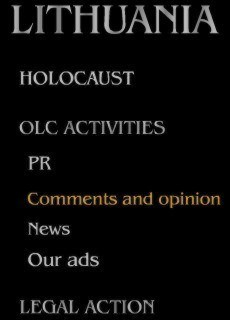|
Last week Israelis who hail from Lithuania gathered at Yad Vashem to commemorate the annihilation of their communities during the Holocaust. This year, the event was marked by the participation of visiting Lithuanian Prime Minister Algirdas Butkevicius, who delivered the keynote address.
As a close follower of Lithuanian-Jewish relations for the past quarter of a century, I was curious how the Prime Minister would deal with pressing issues, such as the highly significant role played by Lithuanians in Holocaust crimes as well as contemporary anti-Semitism. I was also curious as to how our government might attempt to influence him on these questions. And while one might naturally assume that the practical issues would be the most urgent, in Lithuania's case it is actually the historical questions which pose the thorniest problems and the greatest threat to Jewish interests in the long run.
Thus, the most important problem at the moment is the ongoing efforts of Lithuanian governments to minimize the role of Lithuanian Nazi collaborators in Shoa crimes, including the nearly total annihilation of Lithuanian Jewry (96.4%), the murder of tens of thousands of Jews in Belarus and of thousands of Jews deported to Lithuania. These are clearly reflected in the failure of every single government to punish a single hitherto unpunished Lithuanian war criminal, including any of the more than a dozen deported there from the United States. In addition, a list of 2,055 local perpetrators compiled by the government's Center for Genocide and Resistance Research Center three years ago, which only names a small number of the criminals, has been suppressed, rather than being acted upon.
These efforts also include the promotion of the 2008 Prague Declaration, the manifesto of the "double genocide" theory which posits the canard of equivalency between Communist and Nazi crimes, and denies the Holocaust its justified status as a unique case of genocide. This false symmetry also emphasizes the role of Jewish Communists as a contra to the crimes committed by local Nazi collaborators, and has led to attempts to prosecute Jewish Soviet anti-Nazi partisans on trumped up charges of war crimes, and the glorification of anti-Communist fighters despite their participation in Shoa crimes. Even worse, the declaration calls for a joint memorial day for all the victims of totalitarian regimes, which if ever accepted, will no doubt replace International Holocaust Remembrance Day. The practical issues which should have been on the agenda are the plans to build a convention center on the grounds of an ancient Jewish cemetery in Vilna, and the refusal of the mayors of Vilna [Vilnius] and Kovno [Kaunas] to ban neo-Nazi marches held every Independence Day.
Yet despite the importance of these issues, the only "Jewish" subject discussed by Israeli officials with Prime Minister Butkevicius was the plan to build a convention center on the grounds of the original Vilna Jewish cemetery. In fact, according to a JTA interview with the Lithuanian leader, Prime Minister Benjamin Netanyahu gave his blessing to the construction project. Leaving aside the wisdom of this decision, the question is why Israel has consistently failed in recent years to adequately represent Jewish interests regarding Holocaust memory, the narrative of World War II, and anti-Semitism in dealings with the Baltic countries, and especially Lithuania, which undoubtedly has been the worst offender.
The answer apparently lies in one of the paradoxes of current Israeli relations with the post-Communist democracies of the European Union, which have been much more sympathetic to Israeli political positions on the Middle East than their Western European counterparts. Thus these countries were granted a green light to rewrite the history of the Shoa and World War II, and not pressured in regard to local anti-Semitism. Thus, Lithuanian PM Butkevicius can stand at Yad Vashem and proclaim that his duty is to ensure that the truth about the Holocaust will never be concealed; he can thus claim in an interview with the Jerusalem Post that "there is no equation between these two types of crimes", and no Israeli minister or official will respond, despite the fact that Lithuania has done more than any other country to distort the history of the Shoa and the role of its nationals.
Israel obviously needs all the political support it can get, but the time has come for it to stop acting like a hopelessly weak country and start defending the Jewish interests it always claims to represent. At this point in time, Lithuania which is justifiably scared that it might well be the next Russian conquest, needs Israel far more than we need them, and there is nothing wrong with forcefully raising these issues, especially with our friends. Luckily, there will be another opportunity to do so during the upcoming visit of Lithuanian President Grybauskaite.
i24news.tv
| 

